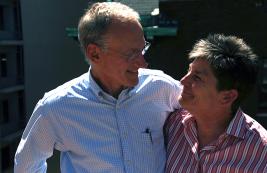By Elizabeth Dunbar
Minnesota Public Radio
June 1, 2010
http://minnesota.publicradio.org/display/web/2010/06/01/clergy-abuse-survivors-reunite-after-kidney-transplant/
 |
| Phil Saviano (left) is doing well nine months after Susan Pavlak gave him a kidney. Photo by Steve Mullis |
St. Paul, Minn. — Phil Saviano had a chance to meet the woman who gave him a kidney nine months ago before the two had surgery in a Boston hospital. His doctors were hopeful the transplant would be successful, but he didn't know for sure if he'd be able to visit Minnesota to thank her again.
Saviano, who lives near Boston, got that chance last week, soon after his doctors gave him the OK to travel. He is spending six days in the Twin Cities with Susan Pavlak, the woman with whom he shares not only a kidney, but also a troubled past and now a friendship.
Both Saviano and Pavlak were sexually abused when they were young by people connected to the Catholic Church. At age 11, Saviano was abused by a priest. Pavlak was abused by a former nun at her Catholic High School.
Decades later, after both fought separate battles for accountability in clergy abuse cases, an e-mail plea landed in Pavlak's inbox: Saviano, founder of the New England chapter of the Survivors Network of those Abused by Priests, needed a kidney transplant, and everyone in his family had already been disqualified.
Pavlak didn't know Saviano, but she knew about his efforts in bringing abusive priests to justice. She also knew Saviano was a fighter: He had battled AIDS for years, and doctors said he had a good chance of living if he found a kidney match.
"I'm giving my kidney to a good place," Pavlak, of St. Paul, remembered thinking when she decided she would undergo the tests and surgery. "He's done wonderful things in his life."
During their interview with MPR's All Things Considered, Pavlak told Saviano that she's thrilled to see him doing so well nine months later.
"I'm grateful that you're healthy and that you're strong," she said.
Pavlak also acknowledged that organ donors and recipients often don't get a chance to meet. Their friendship, she said, "is absolute gravy. I didn't even know that I would get to know you."
Since the transplant, the two have exchanged e-mails and occasional phone calls. They plan to mark the one-year anniversary of the transplant in Massachusetts in August.
Pavlak met many of Saviano's family members last summer, and he's getting a chance to meet several of hers now, including her sister who leads the organ transplant program at the University of Minnesota Medical Center.
Saviano said it's still hard to believe how fortunate he's been. He beat AIDS in the 1980s when many people around him were dying from it, and now he has a kidney that works.
"I feel charged with the responsibility to make the most of it," Saviano said. "I'm very much aware that I've beat the odds on at least two occasions."
Pavlak remains Catholic, and to Saviano, her gesture was the "perfect example of someone putting their faith into action."
"It's the ultimate act of charity," he said.
Saviano has turned his efforts to finding out if there are other people like Pavlak out there who would be willing to donate a kidney to another abuse survivor.
Through his SNAP contacts throughout the U.S., he's trying to help two people in need of transplants. More than a dozen people within the network said they were interested, but so far no match has been found. Donors have to be in excellent health while also matching the recipient's blood type and antibodies.
The effort has again reminded Saviano of his own desperate situation before his transplant.
"It tells me that I was incredibly fortunate," he said.
Any original material on these pages is copyright © BishopAccountability.org 2004. Reproduce freely with attribution.